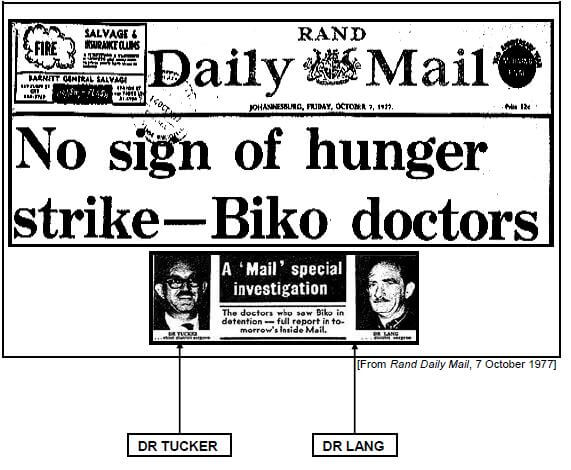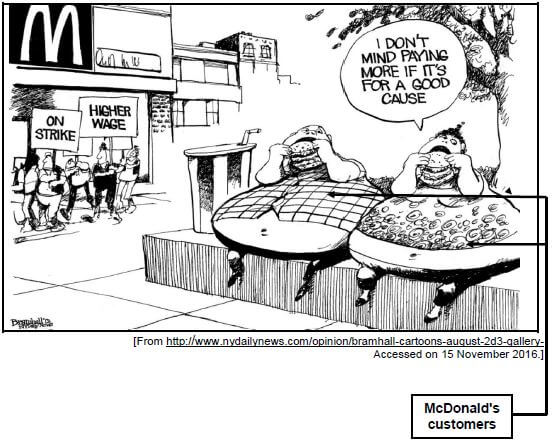HISTORY PAPER 2 GRADE 12 ADDENDUM - NSC PAST PAPERS AND MEMOS FEBRUARY/MARCH 2018
Share via Whatsapp Join our WhatsApp Group Join our Telegram GroupHISTORY
PAPER 2
GRADE 12
NSC PAST PAPERS AND MEMOS
FEBRUARY/MARCH 2018
ADDENDUM
QUESTION 1: WHY DID THE APARTHEID REGIME DETAIN BLACK CONSCIOUSNESS LEADER, BANTU STEPHEN BIKO?
SOURCE 1A
The source below focuses on the formation and impact of the Black Consciousness Movement (BCM).
The Black Consciousness Movement (BCM) was becoming a presence in the country and not only at tertiary institutions, they were visible in the media, at schools, at community theatres, and in events that broke the pattern of quiescence (calm) that followed the banning of the ANC and PAC. But the movement also began to suffer casualties, with Onkgopotse Tiro perhaps the first of these when he was expelled from the Turfloop University (Limpopo). [From http://www.sahistory.org.za/people/stephen-bantu-biko. Accessed on 2 December 2016.] |
SOURCE 1B
The source below explains how Bantu Stephen Biko and his friend, Peter Jones, were arrested and detained near King William's Town on 19 August 1977.
The South African police force set up roadblocks to arrest political activists. At a roadblock outside Grahamstown the police asked Steve Biko and Peter Jones to step out and to open the boot. Jones, who was driving, followed their orders but struggled to open the boot. The car's boot had to be opened in a special way, known only to Rams Ramokgopa at Zanempilo. [From Biko, A Biography by X Mangcu] |
SOURCE 1C
This source focuses on Jimmy Kruger's response to the death of Stephen Bantu Biko. It is taken from an article titled Young Black Leader Dies in Detention in South Africa, Raising Fears of New Unrest by John Burns.
Mr Kruger's announcement said that Mr Biko had been detained on 18 August 1977 under a section of the Terrorism Act that provides for indefinite detention without trial. The Minister of Justice said that Mr Biko had been arrested on suspicion of fomenting (inciting) unrest among blacks in the Port Elizabeth area, 150 miles to the south of King William's Town and of drafting documents urging 'violence and arson' by blacks seeking to overthrow apartheid, the official system of racial subordination. [From http://www.nytimes.com/learning/general/onthisday/big/0912.html#article. Accessed on 10 December 2016.] |
SOURCE 1D
The newspaper headline below appeared in the Rand Daily Mail on 7 October 1977. The article was written by Helen Zille after her investigation into the circumstances under which Bantu Stephen Biko was murdered. 
[From Rand Daily Mail, 7 October 1977] DR TUCKER DR LANG
QUESTION 2: WHY WAS THE AMNESTY PROCESS OF THE TRUTH AND RECONCILIATION COMMISSION (TRC) REGARDED AS CONTROVERSIAL?
SOURCE 2A
This source below focuses on the formation of the Truth and Reconciliation Commission in 1995.
The main objective of the TRC is to establish as complete a picture as possible about gross human rights violations between March 1960, the month of the Sharpeville massacre and subsequent beginning of the armed liberation struggle, and 10 May 1994, the date of Nelson Mandela's inauguration as first democratically elected State President of South Africa. [From Common Past, Divided Truth: The Truth and Reconciliation Commission in South Africa – Public Opinion by G Theissen] |
SOURCE 2B
The source below evaluates the work of the amnesty committee of the Truth and Reconciliation Commission.
The Amnesty Committee was one of the three committees set up by the TRC to deal with political crimes that were committed between 1960 and 1994. It received approximately 7 050 amnesty applications. [From Country Of My Skull by A Krog] |
SOURCE 2C
The source below explains the Truth and Reconciliation Commission's decision to grant members of the African National Congress (ANC) amnesty. The South African Press Association (SAPA) issued the press release below on 2 December 1977.
CAPE TOWN: 2 December 1997 – SAPA The Truth and Reconciliation Commission's Amnesty Committee on Tuesday refused to explain how it arrived at its controversial decision to grant blanket amnesty to 37 African National Congress members, including Deputy President Thabo Mbeki. [From http://www.justice.gov.za/trc/media%5C1997%5C9712/s971202c.htm. Accessed on 23 November 2016.] |
SOURCE 2D
The cartoon by Zapiro appeared in the Mail and Guardian on 19 March 1998. It depicts the issue of blanket amnesty.
[From http://truth.wwl.wits.ac.za/files/3_2/3129-1-4-001art.jpg. Accessed on 5 December 2016.]
QUESTION 3: HOW DO MULTINATIONAL CORPORATIONS, SUCH AS McDONALD'S, EXPLOIT WORKERS?
SOURCE 3A
The source below focuses on how multinational corporations (MNCs) conduct their business. It is an article written by J Skrocki titled Broken Promises: Globalisation and BP Oil.
In an ever-changing and interconnected world, there is opportunity for global corporations to operate by manipulating (abuse) and exploiting. They have the power to do this, and history demonstrates that cutting corners allows companies to maximise profits. The globalised trading system allows many countries to import goods they otherwise would not have access to. However, due to the rapidly globalising market, multinational corporations move their companies overseas to developing countries. This enables them to take advantage of cheap labour and to sell their products at a lower market price. By definition, a multinational corporation has its headquarters in one country, but conducts its businesses in more than one country. Multinational corporations operate in the following ways: franchising, branches, subsidiaries (companies), joint ventures … [From http://aese.psu.edu/students/research/ced-urj/news/2014/broken-promises-globalization-and-bp oil. Accessed on 12 December 2016.] |
SOURCE 3B
The source below is the view of the environmental organisation Greenpeace. It focuses on McDonald's business practices in the global market.
McDonald's only interest is money, making profits from whomever and whatever they can, just like all multinational companies. McDonald's annual reports talk of 'Global Domination' – they aim to open more and more stores across the globe, but their continual worldwide expansion means more uniformity, less choice and the undermining of local communities. [From http://www.mcspotlight.org/campaigns/translations/trans_uk.html. Accessed on 24 November 2016.] |
SOURCE 3C
This cartoon depicts workers (on the left-hand side) at McDonald's striking for higher wages and overweight customers (on the right-hand side). It was drawn by M Lester for the New York Daily News on 31 August 2013 and is titled 'McDonald's Health Care'. 
[From http://www.nydailynews.com/opinion/bramhall-cartoons-august-2d3-gallery Accessed on 15 November 2016.]
SOURCE 3D
The source below focuses on how civil society activists protested in the mid-1980s against the multinational food outlet, McDonald's. It is titled What's Wrong with McDonald's?
Criticism of McDonald's has come from a huge number of people and organisations over a wide range of issues. In the mid-1980's, London Greenpeace drew together many of those strands of criticism and called for an annual World Day of Action against McDonald's. This takes place every year on 16 October, with pickets and demonstrations all over the world. McDonald's, who spend a fortune on advertising every year, are trying to silence world-wide criticism by threatening legal action against those who speak out. Many have been forced to back down because they lacked the money to fight a case. But Helen Steel and Dave Morris, two supporters of London Greenpeace, defended themselves in a major United Kingdom (UK) High Court libel (offence) trial. No legal aid is available so they represented themselves. McDonald's engaged in a huge cover up, refusing to disclose masses of relevant documents. Also, the defendants were denied their right to a jury. Despite all the cards being stacked against them, Helen and Dave turned the tables and exposed the truth by putting McDonald's business practices on trial. Protests against the $30 billion a year fast-food giant continues to grow. It's vital to stand up to intimidation (threats) and to defend free speech. [From http://www.mcspotlight.org/campaigns/translations/trans_uk.html. Accessed on 24 November 2016.] |
ACKNOWLEDGEMENTS
Visual sources and other historical evidence were taken from the following:
http://www.justice.gov.za/trc/media%5C1997%5C9712/s971202c.htm
http://www.nytimes.com/learning/general/onthisday/big/0912.html#article
http://www.sahistory.org.za/people/stephen-bantu-biko
http://aese.psu.edu/students/research/ced-urj/news/2014/broken-promises-globalization and-bp-oil.
http://truth.wwl.wits.ac.za/files/3_2/3129-1-4-001art.jpg
http://www.mcspotlight.org/campaigns/translations/trans_uk.html.
http://www.nydailynews.com/opinion/bramhall-cartoons-august-2d3-gallery
http://www.mcspotlight.org/campaigns/translations/trans_uk.html.
Krog A. 1998. Country Of My Skull (Broadway Books)
Mangcu X. 2012. Biko, A Biography (N.B. Publishers, South Africa)
Rand Daily Mail, 7 October 1977
Theissen, G. 1999. Common Past, Divided Truth: The Truth and Reconciliation Commission in South Africa – Public Opinion
The Citizen, 15 May 2017